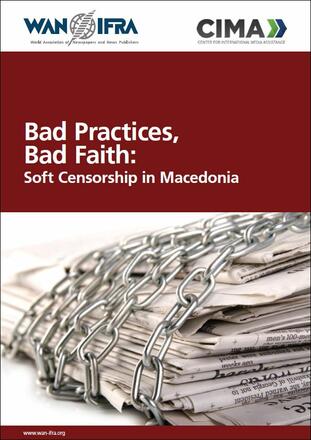
Soft Censorship in Macedonia
In Macedonia today, official financial incentives and partisan influence have resulted in “media capture” by the state, diminishing the industry’s professionalism and credibility, and curtailing its rightful role in fostering democratic development by providing impartial information and a venue for public discussion and debate. Without decided change in this field, any progress in the democratic reforms would be neutralized.
This report, based on extensive interviews with media experts, editors and journalists in Macedonia, outlines the increasing impact of soft censorship, defined as “an array of official actions intended to influence media output, short of legal or extra-legal bans, direct censorship of specific content, or physical attacks on media outlets or media practitioners.”
Macedonia’s small media market forces many media outlets to depend on state funding to remain financially viable, hencefavouring the attempt to dominate the country’s media space through new laws and increasingly partisan use of state resources to support ‘friendly’ media outlets. The Macedonian government is one of the country’s biggest advertisers, ranking number two in 2013 after Proctor & Gamble and ahead of the Coca Cola Company. The ruling VMRO-DPMNE party is the fifth-largest advertiser (p.12).
Government-friendly media are bolstered by various means, particularly with the allocation of official funds, advertising, campaigns, and subsidised projects. This generates an environment in which partisan political and business interests set the media agenda and can directly shape reporting.
The report recommends action to reverse the erosion of media freedom in the country. All state funding for media outlets, including advertising, grants and other subsidies should be entirely transparent and allocated through fair processes supervised by independent bodies and institutions.
Tags: North Macedonia Media funding Media ownershipThe content of this article can be used according to the terms of Creative Commons: Attribution-NonCommercial 4.0 International (CC BY-NC 4.0) . To do so use the the wording "this article was originally published on the Resource Centre on Media Freedom in Europe" including a direct active link to the original article page.

